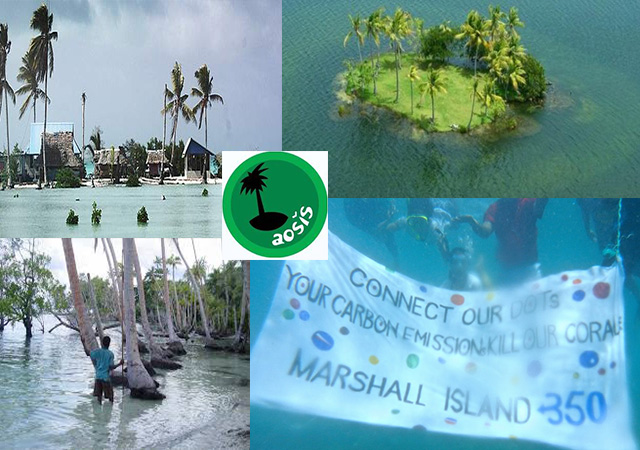 Small states, under the banner of the Alliance of Small Island States (AOSIS), have long clubbed together to make their point on climate change. [photos: From AOSIS]
Small states, under the banner of the Alliance of Small Island States (AOSIS), have long clubbed together to make their point on climate change. [photos: From AOSIS]
Fiji’s role as President of COP23 demonstrates the ability of small states to have an influence on the world stage that is disproportionate to their physical size, be it measured by population, territory or GDP. Traditionally, the limited capacity of small states, especially of those that are remote from the centre of world politics, e.g. New York and Geneva, has been seen as a major obstacle to their participation in multilateral activities. It remains largely true; COP23, although chaired by Fiji, who would therefore be expected to host the event, was actually held in Bonn, not Suva, and was essentially financed by the German government. However, putting endogenous limitations to one side, the Fijian Presidency of COP23 does illustrate a recent development in global politics: that with determination and creative diplomacy, small states can gain support from like-minded large or/and rich countries and in doing so place their interests on the global agenda.
Like many small states, Fiji does not have a permanent diplomatic mission to Germany; indeed it has only a handful of staff in Geneva, who represent the country in all UN agencies and neighbouring countries, as well as providing consular services. This is the key challenge most Pacific Island states, as well as those from the Caribbean, Indian Ocean and Africa, face. They have a limited number of diplomatic missions in Europe, and very infrequent visits of diplomats from their capitals. Indeed, of the Pacific states Fiji is one of the most diplomatically active in Europe, with missions in London, Brussels and Geneva.
Diplomatic representation matters because the scope of climate-related negotiations and discussions is expanding. COP remains the primary forum for deliberations on emission targets but climate change and its impact have considerable ramifications across policy areas. Many of them are of immediate interest to small states, such as access to affordable medicine, sustainable fishing, or protecting their indigenous knowledge and intellectual property. Yet many small states do not even have diplomatic missions in the countries where key international organisations are based, let alone being engaged in their processes as active participants. Without active participation, there have been few ways for small states – the proverbial canaries in the global climate coal mine – to have their voices heard.
This has been slowly changing. Small states, under the banner of the Alliance of Small Island States (AOSIS), have long clubbed together in New York. This is the one city where they are all present and have more or less active diplomatic missions. Even some of the poorest small states have been able to establish a presence by accessing subsidised office space at The Commonwealth Secretariat’s ‘Small States Office’, opened in New York in the early 1980s. The success of this coordinated effort has been astounding. It has defied all of the conventional theories of international relationships that assume policy outcomes are exclusively determined by great powers. By working together and leveraging their weight, small states have been recognised as a specific grouping – small island developing states (SIDS) – within the UN system. And they have used this label, and the position it has provided them in UN processes, to drive a progressive climate agenda. Despite their size, they have unequivocally been a key player – even a leader – in decades of negotiations.
The success of the small state group in New York has led to the label, or a version of it, being adopted by other international organisations (IOs) around the world. The World Bank has a Small States Forum and a published Roadmap for World Bank Group Engagement in Small States. The WTO has the Small and Vulnerable Economies (SVEs), which is often included in Green Room negotiations. In 2016 the IMF published a paper on Small State Resilience to Natural Disasters and Climate Change: Role for the IMF. This recognition of small states’ unique condition has led to important successes: by working with large or rich countries (Botswana and Sweden cooperated over health issues) or taking over the chairmanship at multilateral negotiations to assert their presence and participation (Jamaica chairs the fishery negotiation at the WTO) or taking an active role in regional offices of international organisations, to get their demands met. But, relative to their presence at the UN, the success of these small state groupings has been mixed. There are a number of reasons for this, including the structure of each IO, but a common theme is that small states still do not have the same active presence in these IOs.



